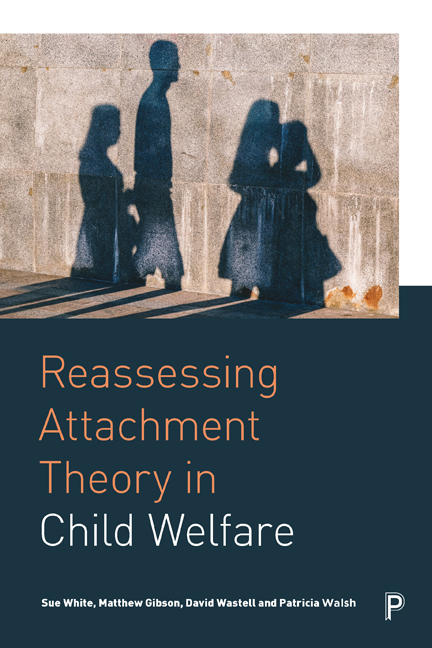Book contents
- Frontmatter
- Contents
- List of Figures, Table and box
- About the Authors
- Acknowledgements
- Preface: Becoming Attached to Attachment Theory
- 1 Love is a Wondrous State: Origins and Early Debates
- 2 Social work and the Attachment Story: a Felicitous Bond?
- 3 Shaping Practice: Prescribing Assessment
- 4 Practising Attachment Theory in Child Welfare
- 5 Exhibiting Disorganised Attachment: not even Wrong?
- 6 Breaking the back of love: Attachment Goes Neuro-Molecular
- Coda: love Reawakened?
- References
- Index
5 - Exhibiting Disorganised Attachment: not even Wrong?
Published online by Cambridge University Press: 23 February 2021
- Frontmatter
- Contents
- List of Figures, Table and box
- About the Authors
- Acknowledgements
- Preface: Becoming Attached to Attachment Theory
- 1 Love is a Wondrous State: Origins and Early Debates
- 2 Social work and the Attachment Story: a Felicitous Bond?
- 3 Shaping Practice: Prescribing Assessment
- 4 Practising Attachment Theory in Child Welfare
- 5 Exhibiting Disorganised Attachment: not even Wrong?
- 6 Breaking the back of love: Attachment Goes Neuro-Molecular
- Coda: love Reawakened?
- References
- Index
Summary
In this chapter, we examine the category ‘disorganised attachment’, recently subject, as we have glimpsed, to a good deal of critical debate. As Duschinsky (2015) notes, this classification has come to prominence because of its alleged relationship with child abuse and abusive parenting, vividly invoked in a contribution to a debate on early intervention in the UK's House of Commons from Andrea Leadsom, a Member of Parliament:
[I]f a baby has what is known as disorganised attachment— where one or both parents are frightening or chaotic— they cannot form a secure bond precisely because the person who is so frightening and chaotic is also the person whom the baby should be turning to for comfort. The baby's brain is confused and they experience disorganised attachment, which leads to very significant problems for that baby. If we look into the babyhood of children who brutalise other children, of violent criminals or of paedophiles, we can often see plenty of evidence that sociopaths are not born; rather they are made by their earliest experiences when they are less than two years old. (Leadsom, 2010)
Yet, there is some considerable debate in the primary literature about what the classification really means (Rutter et al, 2009; Duschinsky, 2015). Indeed, it is suggested that it might be possible that the Strange Situation Procedure (SSP) itself – which is, after all, a ‘strange situation’ – elicits disorganised behaviours. For example, Mesman et al (2018, p 857) ponder whether the unusually high numbers of disorganised infants (23%) in a Dogon subsistence farming community in Mali subject to the SSP may have been due to the infants finding the procedure ‘highly’ instead of ‘mildly’ stressful. Yet we can see that this degree of uncertainty has not dampened enthusiasm for the classification in policy and practice. Increased transparency in the family courts with more cases being reported provides evidence that the classification is being invoked in expert reports to the family courts as the following extracts from four different cases show.
Extract 1
The mother, as a result of her own needs, was unable in Dr Williams’ view to fulfil her parenting role. Her parenting approach was emotionally harmful to the child, who required a reparative parenting experience. It would not be advisable for the mother to remain in her current role as the child's primary parent.
- Type
- Chapter
- Information
- Reassessing Attachment Theory in Child Welfare , pp. 83 - 106Publisher: Bristol University PressPrint publication year: 2019



